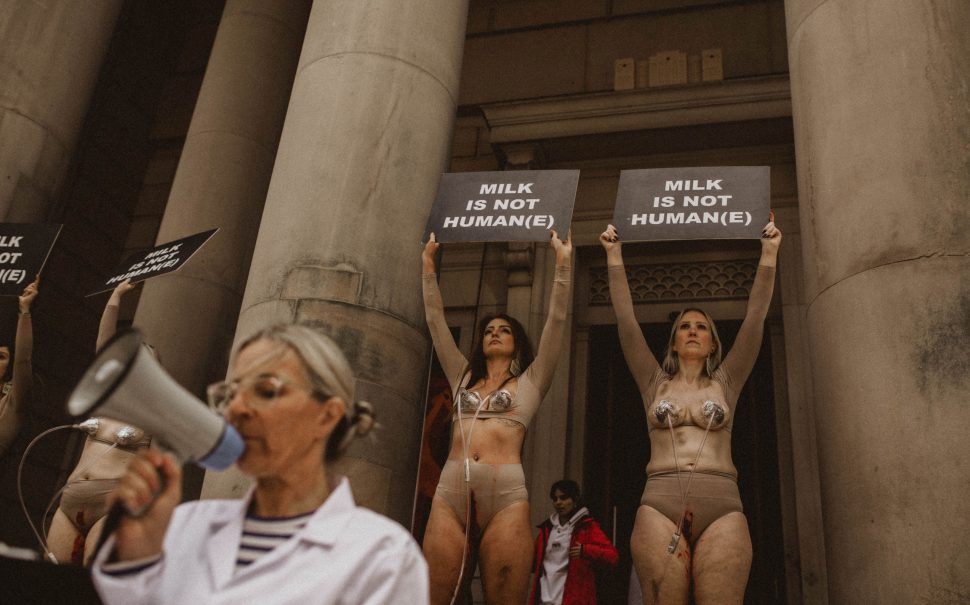They may make up only a small proportion of the vegan population, but older vegans can be invaluable in changing people’s attitudes toward veganism. So what can young people learn from those who stopped eating animal products long before it became mainstream?
With tinfoil teat cups attached to her breasts, Cathryn Bostock was no different from the rest of the protesters.
Yet there was one uncommon thing about her participation – her age.
Earmarked and half-naked, she was lined up next to women 15-20 years her junior outside the Manchester Art Gallery last summer in a bid to bring attention to the message on their signs: Milk is NOT human(e).
The performance was brought by animal rights activist and artist Stephanie Lane, and saw women around the world depict the dark underbelly of the dairy industry, with their own bodies.
In Manchester, only three out of the 13 activists were over 45.
“I think over-45s may be less likely to go vegan as maybe they are set in their ways, and it’s the usual ‘We’ve always done this so it’s OK’ mentality,” said Bostock, 46.
“Younger people are often more open to change and wishing the world was a better place.”
In fact, young people are 40% more likely than older generations to become vegan, according to new research by The Vegan Society.
Out of 10,194 respondents, a total of 122 people identified as vegan (1.20%), and only 46 of those were over the age of 45.
Because of these low numbers, older vegans are invaluable to the vegan movement, Bostock said.
“I do a lot of street outreach, and whilst most of the team are younger, there are a few of my generation, and I think it’s good to have a range of ages when talking to the public about veganism so that different people relate to different-aged people,” she said.
“A lot of over-50s have potentially been vegan a long time, and that’s good for people to see. I always say I haven’t eaten meat for 36 years.”
The data also revealed that despite older vegans making up only 37% of the vegan population in the UK, they show more commitment to the vegan lifestyle.
More than twice as many vegans between the ages of 45 and 54 (61%) said they avoided visiting animal attractions and using products that had derived from animals or been tested on animals, compared to those aged 16-24 (27%).
Half of the over-45s said they had been vegan for over five years, whereas that figure was only 40% for vegans under 45.
A vegan since the early 1990s, Andrew Moore, 56, from Bolton, agrees that older vegans are great advocates for veganism as they “show the wider world that it’s not a trend or a short-term fad”.
They’re living proof that “humans can thrive for their entire lives living vegan,” he said.
It was due to a hard-hitting realisation that Moore went from vegetarianism to veganism nearly 35 years ago.
“Animal rights activist friends back home in the north east had zines that I read and it struck a chord,” he said.
“The one line I read that made the difference was: ‘If you were an animal bred for human consumption, including those for eggs and dairy, would you rather be killed quickly or live a life of torture and pain in captivity until you eventually die, exhausted and broken?’
“That’s the difference between vegetarian and vegan.”
But Moore acknowledges that older people might be less exposed to information that would assist them in transitioning to veganism.
Bostock said that had she not stumbled upon two videos shared by a DJ she followed on Instagram three and a half years ago, she might have remained “blissfully unaware” of the practices in the dairy and egg industries.
She said: “I realised I had been lied to all my life by being told eggs and dairy are harmless and you don’t kill the animal.”
Bostock referred to cattle breeding as a “continuous cycle of rape” due to the many artificial inseminations the cows are subjected to in their lifetime – one each year. For reasons of economic gain, most importantly milk production, the mothers are separated from their calves within 24 to 48 hours of giving birth, and a few months later the cycle repeats.
“I then learned the truth and actually think dairy cows lead a more tragically horrific life than beef cows,” she said.
She urges people who want to know more about how these industries operate to watch Kip Andersen’s documentaries Cowspiracy, Seaspiracy and Christspiracy as well as the Australian documentary Dominion, Game Changers and I Could Never Go Vegan.
Hilary Cockshaw, 48, from Macclesfield, went vegan after watching a couple of these documentaries. Like Bostock, she believed her vegetarian lifestyle had been “enough” to help stop animal cruelty and that cows naturally overproduced milk and needed to be milked to not get ill.
“I quickly realised that if my position was due to the cruelty to animals then it wasn’t a logical standpoint. I had to be vegan. So that’s what I did,” she said.
“There is no feeling like living more closely aligned to what you actually believe. Animal cruelty is wrong. I live in a way which isn’t cruel to animals. It’s simple.”
In a bid to boost the numbers of older vegans, The Vegan Society is planning to launch a variety of “uplifting” campaigns and events this year, such as member-exclusive webinars on matters relating to plant-based diets and the menopause.
The website already includes a ‘life stages’ section, accessible to non-members, which offers general guidelines on nutrition for pregnant and breastfeeding women, under-fives, five to 10-year-olds, teenagers, and older people.
A spokesperson from the charity said the average age of their members was 45, which they see as a sign that “the charity’s message, and ways in which it promotes a vegan lifestyle, appeals to a broad age range including to those in their 40s and above”.
Vegan Runner Jenny Taylor, 47, from Prestwich, said: “It’s never too late to make a difference.
“I first became vegan in 2002, when living in Prague and when I was part of the DIY punk and hardcore scene – it had a lot of people who were political and interested in animal rights and veganism, so I was surrounded, and positively influenced, by vegans.
“I was vegan for about eight years, but ended up stopping for a while and going back to being vegetarian. I’m not even sure why, but in hindsight I wasn’t particularly happy with my own life at the time.
“I never felt good about that decision ethically-speaking and eventually, with the help of a vegan fitness coach, I went back to it three years ago.
“It’s never been easier to transition.”
Main image courtesy of Calvin Tasker Photography.




